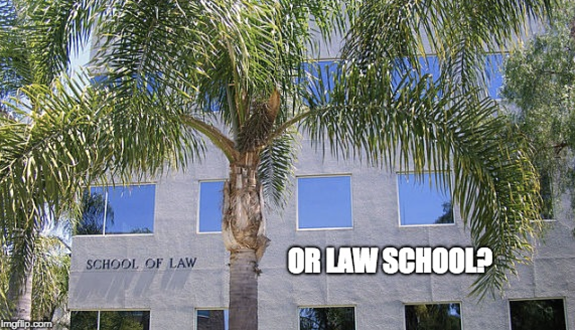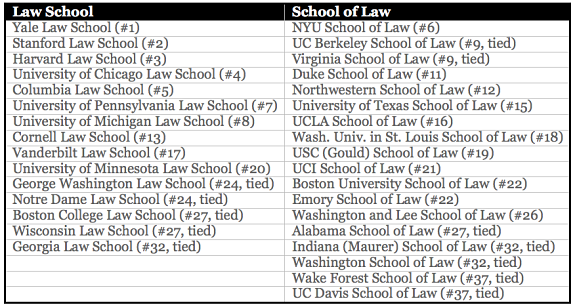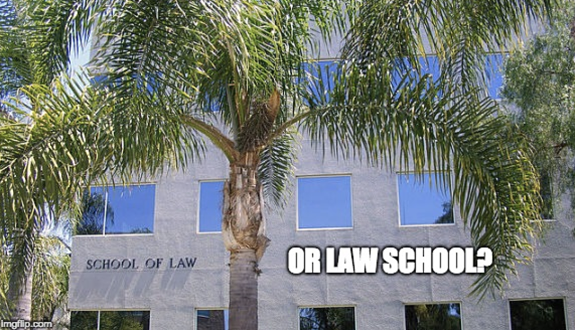
In debating where you should go to law school, there are many factors to be weighed and contemplated. There are considerations even beyond the boring-old things everyone talks about, like ranking, prestige, location, financing, and cetera. Some law schools give you a good shot at passing the bar exam, while others do not. Some law schools have the status and connections to help you land that remunerative job that will bring in enough lucre to repay the cost of school before your temples grey and your body ripens into a soft middle age, while others have neither. Some laws schools will remain open and ABA-accredited throughout your three years spent there, while others, sadly, will not.
You’ve probably thought about these things — and if you have not, take it from us, the fourteenth best law school advice blog in the law school advice blog game*, you want to go the schools with the former characteristics. But there’s probably one factor you haven’t considered: Some J.D.-conferring institutions call themselves “Law Schools,” while others are call themselves “Schools of Law.”
*At least according to an aggregator who didn’t notice that we post more than three times a month. That said, let’s hope they don’t notice this post.
Perhaps you haven’t even noticed this distinction. It’s not something I noticed until I started managing this blog. But now that I’m doing that, I would estimate that at least 80% of my time editing blog posts involves fact checking whether Georgetown is a “Law School” or “School of Law” [Ed Note: It is a “Law Center,” technically]. This prompted me to ask, “Which one is better?” All else being equal, is it better to go to a “Law School” or a “School of Law”? As far as I can tell in my research, no one else is willing to ask this tough question. So I took it upon myself to break it down for you. I’ve broken my inquiry down into four categories — reputation, ease of use, mouthfeel, and intangibles — and used a proprietary algorithm to assign between zero and twenty-five points to “Law School” and “School of Law” for each category. In the end, a winner will be declared, and this debate will finally be settled.
Reputation
Do Law Schools carry a better reputation than Schools of Law? To figure this out, we looked at the industry leaders in reputation-quantification, U.S. News & World Report, to see how they ranked Law Schools versus Schools of Law. For the top forty law schools, here’s how USNWR’s rankings break down:

Source: U.S. News & World Report 2019 Rankings.
Not Included: Georgetown University Law Center (#14); Arizona State University Sandra Day O’Connor College of Law (#27, tied); University of Iowa College of Law (#27, tied); Ohio State Moritz College of Law (#32, tied), University of Illinois – Urbana-Champaign College of Law (#37, tied), The Marshall-Wythe School of Law at William & Mary Law School (#37, tied)
As you can see, “Law School” is an absolute murderer’s row of T14 schools, including each of the top five schools. “Law School” lacks the depth of “School of Law,” but from one through twenty, it’s the ’27 Yankees, the 2017 Warriors, The Expendables 3.
So yeah, “Law School” is going to take this one. But not by the landslide you might expect. A closer examination reveals that the institutions included in the “Law School” column tend to be older, and more likely to be in the East Coast or old South. The institutions in the “School of Law” column tend to be newer, and more likely to be in West Coast or Midwest. Now, we’re not denigrating any of the fine institutions that call themselves “Law Schools,” but their reputations may be partially the result of biases that favor old money East Coast and Southern elites. And I’m not here for those biases. Anyway, the final scores for the “Reputation” category are:
Law School: 22/25
School of Law: 18/25
Ease of Use
This is another category that’s going to favor “Law School.” It’s tough to ignore the fact that “Law School” has two syllables, while “School of Law” has three. As someone who is writing over 1000 words on this of all topics, I clearly don’t think brevity is worth everything. But it’s definitely worth something. Plus, there’s some awkward pluralization going on with “Schools of Law,” which reminds me of the pedants in law school who insisted that it’s “attorneys general,” not “attorney generals.”
Law School: 23/25
School of Law: 16/25
Mouthfeel
An exercise: say, “Law School,” right now, aloud, to yourself. It doesn’t feel that nice, right? “Law School” is a dull spondee of two stressed syllables, providing no bounce or lift or rhythm. It’s plodding, sounding like two massive law casebooks hitting the floor in quick, arrhythmic succession. The “aw” sound (/ɔ/) that ends “law” leads awkwardly into the sibilant that begins “school” (/sk/). Try to say it again, quickly. Did you say “law sh-kool” instead of “law s-kool?” Yeah, a lot of people do. That’s a phenomenon known as “S-backing,” which occurs when your tongue has to stay low and receded in your palette as it transitions from the “-aw” to the “sch-.” Plus, the two “l” sounds (/l/) that ensconce the phrase sharply close off the entire phrase, as if they were two bars in a prison cell. The entire phrase is awkward, difficult, and closed off. It paints a picture of law school as three solitary, difficult years, completely confined from the rest of your life.
Now say, “School of Law.” Much better, no? Yeah, “School of Law” is much more euphonious anapest, with two unstressed syllables followed by a stressed syllable. There’s a lift to the phrase, almost as if you’re climbing from the “school,” to the “of,” and finishing, atop the peak, at “law.” There’s a narrative in the phrase law school — the idea that law school is an opportunity for you to climb, to grow, to discover, and to finish at better place from which you began. “School of Law” also finishes on the open vowel /ɔ/ rather than the closed /l/, underlying the fact that a “School of Law” is the beginning of something — of a legal career, open to unlimited possibility.
On phonetics alone, the more musical phrase “School of Law” takes the “Mouthfeel” category in a drubbing.
Law School: 8/25
School of Law: 23/25
Intangibles
For the final category, we’re covering the “intangibles” of the phrases — unquantifiable aspects of these phrases that make us feel a certain way. Perhaps it’s because “Law School” is the much more common of the two, but it’s clearly the more dread-producing phrase. When put in front of the “School,” “Law” connotes that this is a school that teaches laws. Which is much more intimidating. Schools are already scary, but now we’re talking about a school that teaches you about laws, which are, of course, rules that can put you in jail. Very scary stuff. On the other hand, saying that it’s a “School of Law,” makes the “Law” seem more like a characteristic the school possesses. It’s a school, sure, but instead of the wild and chaotic elementary schools of yore, this is a school that promotes law and order — a school in which your health and safety and property will be respected and protected. The analytics back this up: “‘Law School’ Scary” produces 6,310,000 Google results, while “‘School of Law’ Scary” produces only 750,000.
Plus, there’s just an inherent classiness of “School of Law” that “Law School” lacks. Phrasing anything with the more Romantic language-derived “of” will class it up. A “Club of Gentlemen” evokes a stately room with leather-bound books and expensive cognacs where men of substance and taste discuss literature and philosophy. A “Gentlemen’s Club” is a strip club. Your honor, I rest my case.
Law School: 11/25
School of Law: 22/25
Final Scores
In the end, our rigorous process clearly indicates that you should go to a “School of Law,” all else being equal. You’re welcome, America.
Law School: 64/100
School of Law: 79/100




